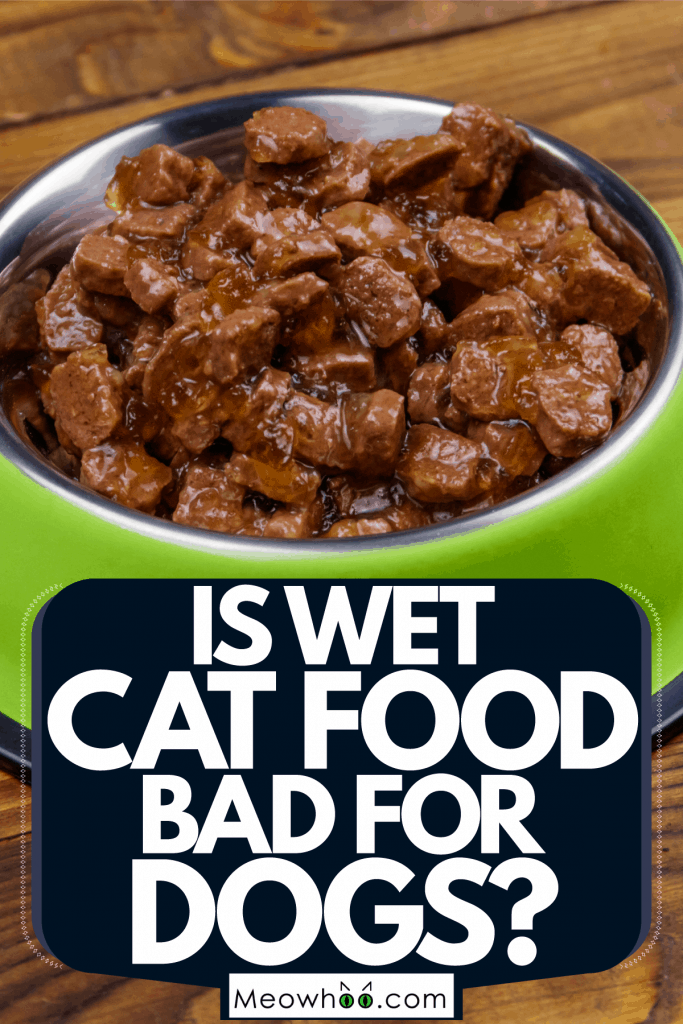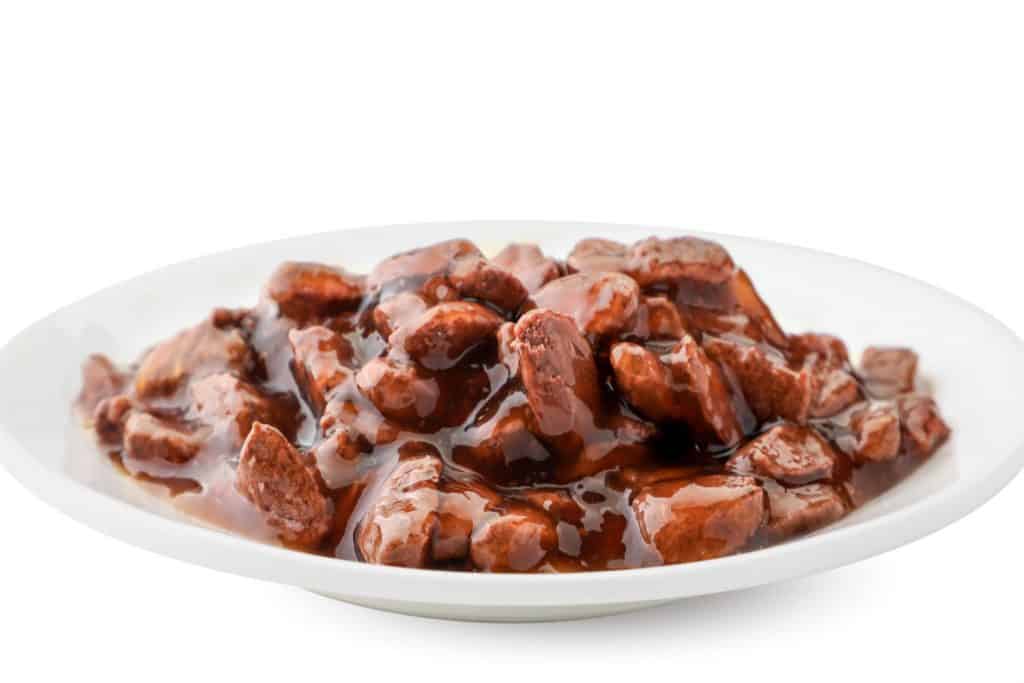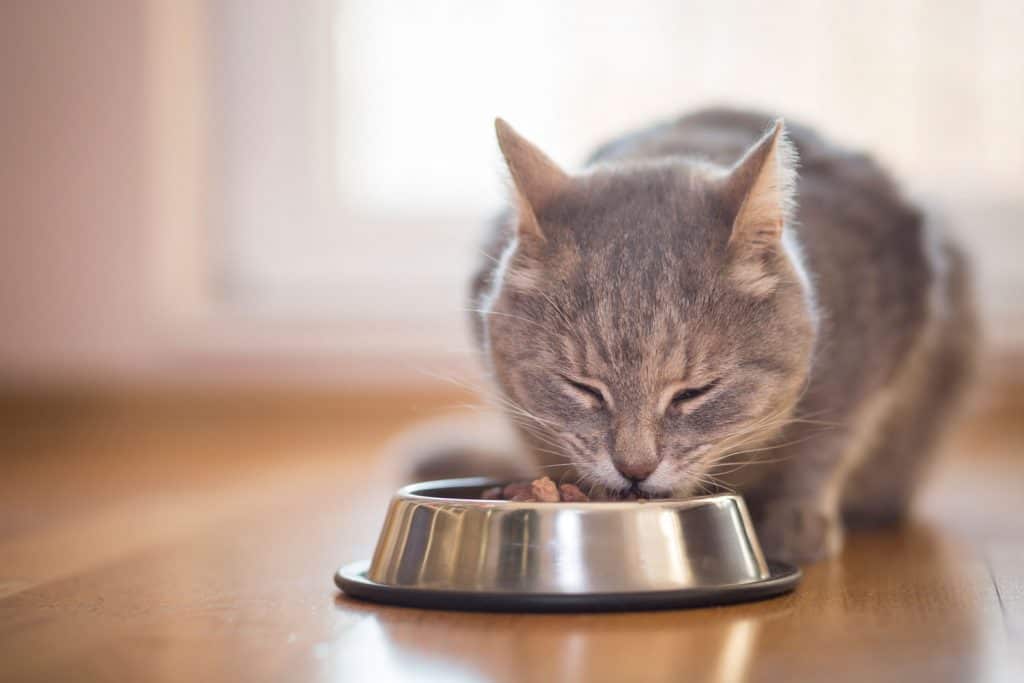It’s fun to have cats and dogs at home. But turn your back for one second and you see your pups eating your cats’ wet food. Now you’re wondering if wet cat food is bad for dogs. We researched and asked the experts in the pet industry about this concern to give you the right answers.
Dogs won't feel any significant harmful effects from eating wet cat food if consumed once per day and in small amounts. However, canned or wet cat food isn’t advisable for dogs since these animals are omnivores, which means they need meat, grains, and vegetables to acquire balanced nutrition. Feeding cat food to dogs every day will result in malnutrition.
Continue reading to understand why wet cat food isn’t optimal for a dog’s health. Also, we’ll present other relevant information about the topic so you’ll know why it’s important to stick to your pet’s recommended diet.

Why is Cat Food Not Ideal for Dogs?
Most cat foods have significantly high protein content that can be harmful to dogs. Adult dogs only need about 10% protein from their daily diet. On the other hand, the recommended daily requirement of protein in adult cats is about 26%.
The Association of American Feed Control Officials (AAFCO) even recommends that feeding cats protein higher than 30% of their daily protein requirement helps maintain the animals’ optimal health. Senior cats over 12 years old should even have diets consisting of about 50% protein.
Furthermore, the fat content in cat food is also higher than the average dog food. Like protein, cats need more healthy fats than canines. In perspective, cats need about 24% healthy fat in their food while dogs only require approximately 5.5%.
If dogs eat more than the recommended amount of nutrients, health issues can appear. For instance, the excess protein stored in a canine’s body will become fat, promoting risks of issues like obesity. Also, excess fat can lead to cardiovascular diseases.
What is in Wet Cat Food?

Wet cat food has ingredients tailor-made for a feline’s nutritional requirements. Most cats love the wet consistency and mushy texture, making it easy for these animals to eat and digest. Reliable brands ensure that their wet cat food can secure the nutritional needs of these pets by providing the right nutrients.
Common Ingredients in Wet Cat Food
High Moisture Content
Cats need significant amounts of moisture to help improve their urinary tracts. Feeding felines with dry kibble frequently without providing enough moisture can lead to issues like diabetes or renal disease. Cats also have low thirst drive, which makes wet food more important for their dietary needs than dry options.
High Protein Content
Cats' protein requirements are significantly higher than dogs'. One reason is that cats are carnivores whereas dogs are omnivores. Therefore, cats have fewer choices for protein sources than dogs. Also, a cat's body burns more amino acids from proteins than dogs, which help preserve the feline's muscles and maintain a healthy bodily process.
High Carbohydrate and Fiber Content
Feeding carbohydrate- and fiber-rich foods to cats help provide them with energy and bulk. Certain wet food options include ingredients like wheat and corn because these selections are good carbohydrate and fiber sources for cats. Thankfully, many wet food options are easy to digest for cats, unlike the carbohydrate-fillers in dry foods.
Sufficient Fat Content
Cats need healthy fat to help maintain their bodies’ temperature and control inflammation. Fat content in meats, fishes, flax seeds, and vegetable oils can contain nutrients like omega-3 and omega-6 fatty acids to contribute towards the optimal well-being of cats. Feeding healthy fats to felines can also improve the animals’ coat quality and skin health.
Vitamins and Minerals

Wet cat food can also have rich amounts of vitamins and minerals needed for a cat’s health. These nutrients include vitamins A, D, E, K, and B-complex for sufficient fat and water absorption. Additionally, minerals like calcium and iron help improve and preserve the pet’s bone, muscle, and nerve health.
What are the Nutritional Needs of Dogs?
According to a book from The National Academies Press, dogs are omnivore creatures that need the right balance of healthy components ranging from protein to vitamins and minerals.
Protein
Dogs need dietary protein with ten essential amino acids in their food to help develop and maintain their muscles and bones. Additionally, this macronutrient helps enhance carbon chains to aid in transforming glucose into energy.
Fats and Fatty Acids
Aside from protein, dogs also need a healthy amount of fats and fatty acids. The right amount of healthy fat can help canines maintain normal cell structure and function. Plus, fatty food is quite tasty to dogs, making feeding times reasonably easy.
Vitamins and Minerals
Like cats, dogs also need vitamins A, D, E, K, and B-complex, which is in many dog food options. Additionally, these animals also need minerals like calcium to improve the formation of bones and teeth, as well as magnesium to complement enzyme functions.
Why Does My Dog Eat Cat Food?
Dogs can find cat food irresistible because of the high protein and fat content. An article from the PBS Organization explains that a dog can pick up scents 10,000 times better than a human's sense of smell. Therefore, these animals pick up the tiny traces of fat, protein, and other tasty ingredients in cat food, especially since most foods for felines are rich in meat.
Is It Ok For Dogs To Eat Dry Cat Food?
It’s fine for dogs to eat cat food, regardless of the dish’s moisture content. However, pet owners should monitor their dogs’ cat food consumption. Canines eating significant amounts of cat food can lead to upset stomachs because of the nutrient imbalance. Furthermore, Dr. Patty Khuly explains in a post that frequent cat-food eating can put dogs at risk of obesity and pancreatitis.
Can I Mix Cat Food with Dog Food?
Mixing different pet foods can cause nutritional imbalances in animals that eat these dishes. Take note that cat and dog foods are specially formulated to suit the animals' dietary and nutritional needs. Feeding a combination of both types of food can lead to issues like over or underexposure to certain vitamins and minerals.
What Happens When A Dog Eats Too Much Cat Food?
Dogs that frequently or only eat food designed for cats will encounter high risks of health issues like obesity and digestive upset. Pancreatitis may also occur, and this concern needs immediate veterinary care. Dog owners should stay alert for certain signs that their pooches ate too much cat food. These symptoms include:
- Vomiting
- Diarrhea
- Appetite loss
- Lethargy
- Weakness
- Abdominal pain
- Unexplained weight gain
Pet parents should also check if their canines are barking or howling excessively with seemingly no reason for these actions, especially when these animals ate cat food recently. These instances can indicate that the dogs feel pain and require urgent veterinary care.
Final Words
Dogs can eat wet cat food occasionally. However, pet owners should avoid feeding cat food to their canines. Otherwise, nutritional imbalances occur, which can lead to serious health issues like diarrhea, obesity, and pancreatitis. If dogs have eaten too much cat food, pet parents should look for signs like vomiting, appetite loss, or unexplained weight gain. For more information about cats and their nutritional needs, check out Meowhoo.
Some elements on this page may have been created by our team using advanced AI to provide you with top-notch cat inspired ideas. Read more about our AI Content Policy.
